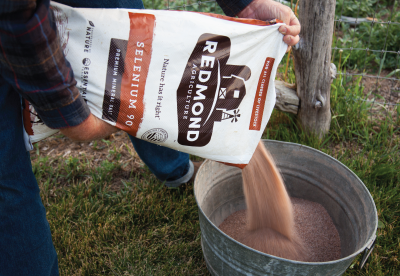Free access to minerals is crucial in all stages of life for your cows. However, there are periods where extra supplementation is needed to ward off disease, increase productivity, and set your animals up for a healthier future. Let’s take a more in depth look at the dry period, what your herd needs, and why.
The Dry Period
Giving your cows a healthy dry period before calving and lactating directly impacts:
- Ease of calving
- Milk yield and quality
- Future reproduction rates
- Metabolic health
- Resistance to disorders and diseases
- Calf health
For years, agricultural scientists have supported the idea that lifelong performance can be pre-programmed into cattle before calving. This “fetal programming”, which in part involves extra mineral supplementation, is one way to not only reinforce the health of the cow, but also your herd’s next generation.
For example, in a recent study, beef specialist Reinaldo Cooke (Oregon State University) discovered that extra mineral supplementation during the dry period significantly improved calf gains:
“Just putting simple math to it, we gained up to $70 in calf value with an investment of $2 or $3 per cow”
Investing during the dry period can yield significant gains during calving and lactation.
Did you know?
“As much as 50% of the absorptive area in the rumen may be lost during the first 7 weeks of the dry period” (National Research Council)
It's no wonder dry cows need extra minerals!
Dry Cow Health Concerns
Mineral supplementation during the dry period develops a more robust immune response and supports a healthy metabolism. Let’s look at some of the health concerns of dry cows and how minerals can help. *Note: many of these disorders can be interrelated and targeting metabolic health in general can help across the board.
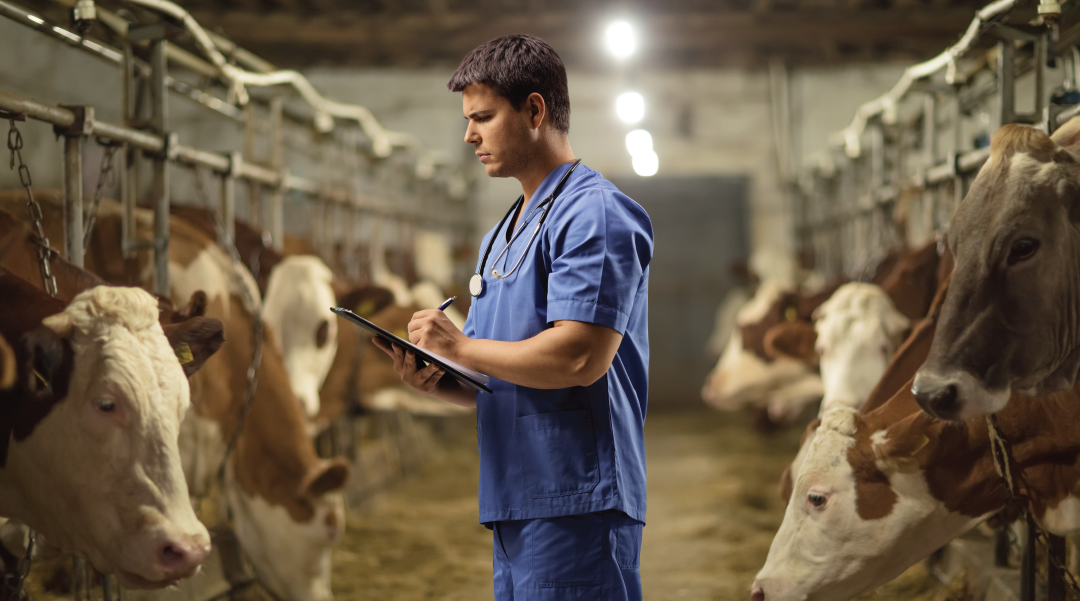
Ketosis Prevention
Ketosis is a metabolic disorder that usually occurs within 2 weeks after calving. After giving birth, milk production and physical recovery consumes a lot of energy which can cause a negative energy balance. As body fat is metabolized, non-esterified fatty acids (NEFAs) build up in the blood and overwhelm the liver. Mineral supplementation during the dry period can correct metabolic imbalance and prepare your cows for the added strain of calving and lactating.
- See mineral list below to learn which minerals boost metabolic health
Retained Placenta (RP)
Retained placenta (aka retained fetal membrane or retained cleansing) happens when the placenta fails to separate from the mother within 24 hours of birth. RP not only exposes your cow to serious infections, but it can also delay their next pregnancy by several months. Dry cow management is the best way to prevent RP from occurring.
According to UC Davis Veterinary Program, one of the most obvious ways of preventing RP is:
“make sure your trace mineral and vitamin supplementation program is adequate” and points specifically to selenium, iodine, vitamin E and A.
Milk Fever/Hypocalcemia
According to University of Minnesota:
“Milk fever, or hypocalcemia, has been a problem of fresh cows for over two centuries. Effective nutritional management during the dry period and early lactation has decreased clinical cases of milk fever to rates lower than 1 percent.”
When blood calcium levels are too low, your cow’s body begins “mobilizing” calcium stored in their bones. For short periods of time, this natural mobilization is not a concern but can be detrimental over time. However, it is best to avoid heavy supplementation of calcium because your animals can become over-reliant on supplements, excess calcium is wastefully excreted, and can have harmful effects within the body. Metabolic stability can be achieved when animals have access to a balanced profile of electrolytes, other macrominerals, and trace minerals. Just look at how Redmond’s balanced mineral mixes can stabilize your cow’s liver mineral concentrations!
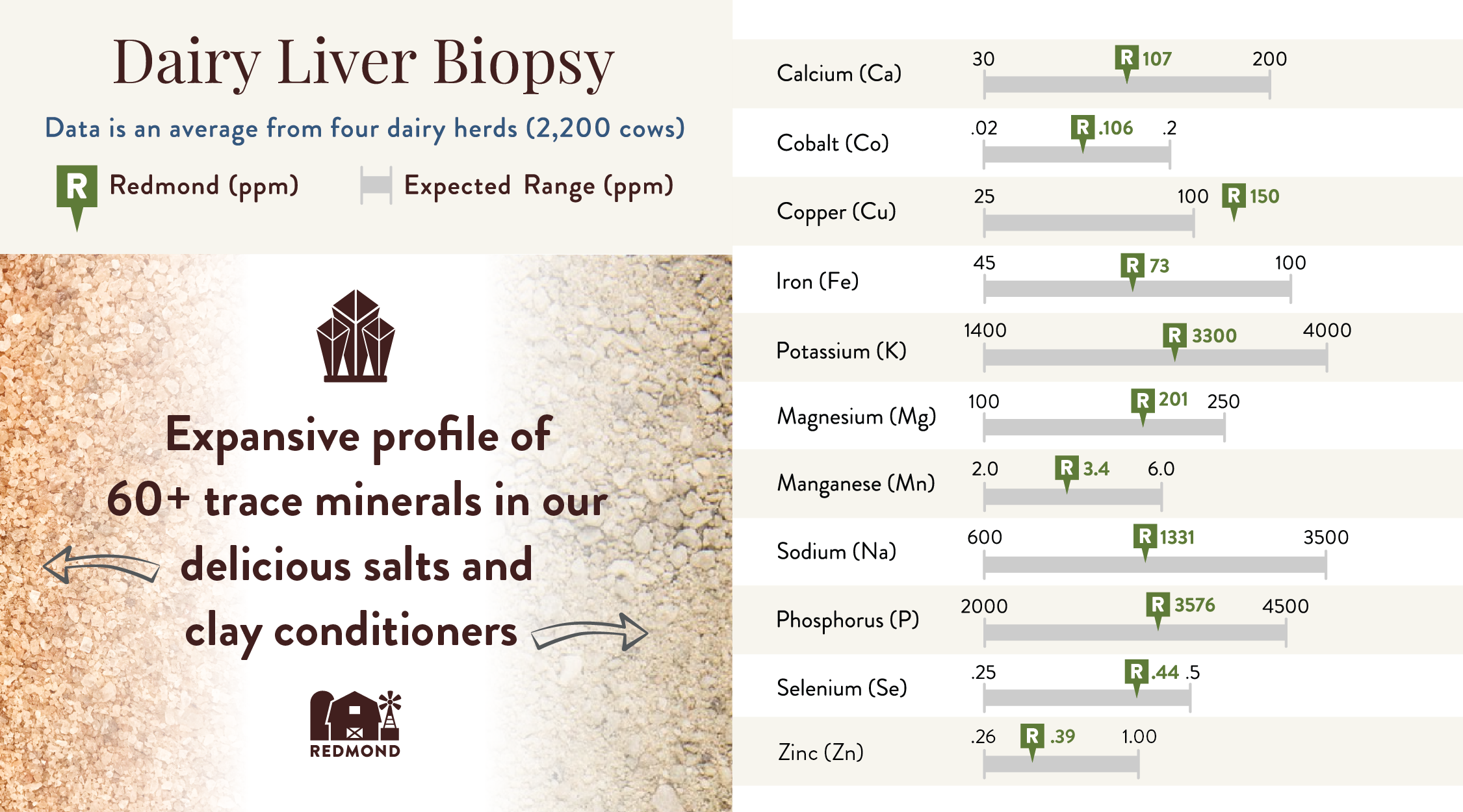
- Learn more about living cow liver biopsies and why they are more accurate than blood testing.
Dry Cow Mineral Requirements
First, Test Your Soil and Forage
The mineral levels of your soil and forage vary quite a bit from year to year and acre to acre. Testing your soil and forage is the best way to know what your specific deficiencies are and what supplementation you will need. For example, most North American soils are naturally deficient in selenium and grazers will need extra supplementation.
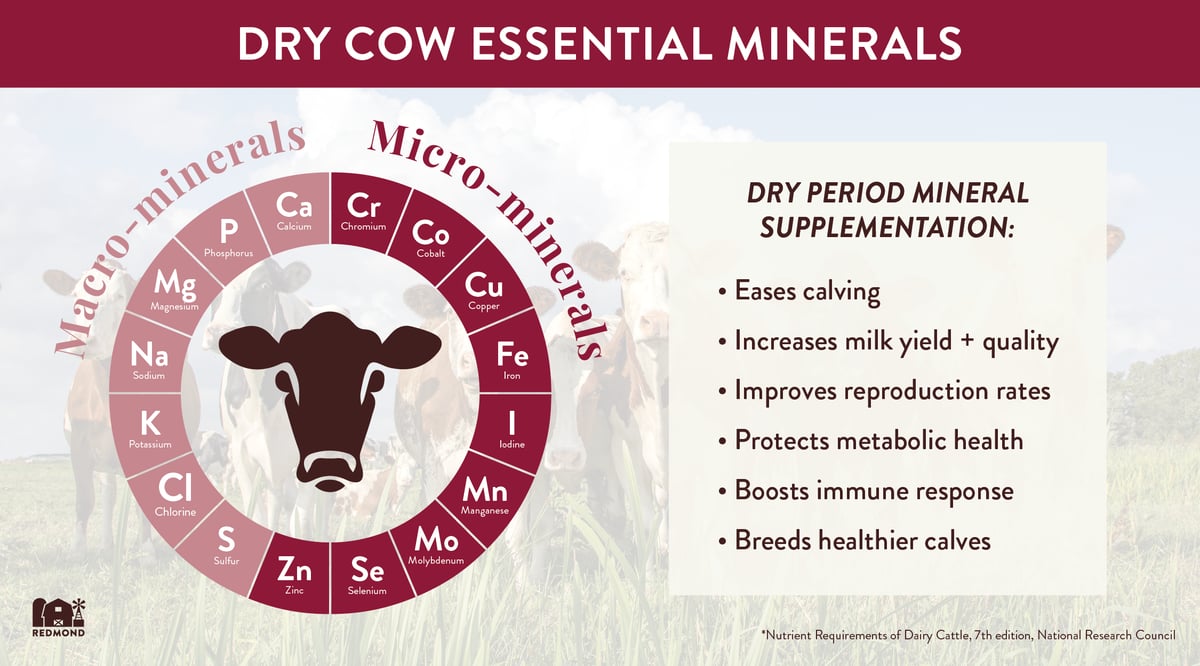
Dry cow essential Macrominerals
The following are listed as 7 essential macrominerals for dry cows: (According to the Nutrient Requirements of Dairy Cattle, 7th edition, National Research Council)
- Calcium- skeletal tissue formation, essential electrolyte that transmits nerve impulses and contracts muscles, component of milk
- Phosphorus- has more known biologic functions than any other mineral element, located in every cell of the body and almost all energy transactions, teeth and bone formation, controls acid-base balance in blood, composes cell walls and other cell contents
- Magnesium- powers metabolic enzyme reactions, essential electrolyte that transmits nerve impulses and contracts muscles, bone formation
- Sodium- essential electrolyte that transmits impulses in nerves and heart, nutrient transport
- Potassium- essential electrolyte that transmits nerve impulses and contracts muscles, regulates osmosis and water balance in cells, acid-base regulation, activates many enzymes important for amino acids and protein synthesis
- Chlorine- works with the other electrolytes, transports carbon dioxide and oxygen, regulates osmosis, helps protein digestion and pancreas function
- Sulfur- formation of amino acids and proteins, acid-base balance
dry cow essential Micro or Trace minerals
The following are listed as 9 essential microminerals (trace minerals) for dry cows: (According to the Nutrient Requirements of Dairy Cattle, 7th edition, National Research Council)
- Chromium- supports metabolic function, essential for insulin action and glucose metabolism
- Cobalt- used by ruminal microorganism to make vitamin B-12
- Copper- forms enzymes that build collagen and elastin in strong joints, absorption and transport of iron, antioxidant that boosts immune function and disease resistance
- Iodine- synthesis of hormones that regulate energy metabolism
- Iron- main component in the creation of hemoglobin
- Manganese- antioxidant, supports growth and fetal development, prevents growth/skeletal abnormalities
- Molybdenum- formation of essential enzymes found in milk and many tissues, may enhance rumen microbial activity
- Selenium- antioxidant that boosts immune function and disease resistance, formation of many essential proteins
- Zinc- supports many biochemical reactions needed for fetal growth, protein synthesis, carbohydrate metabolism, and reproductive performance
Dry Cow Minerals From Redmond
Since the 1950s, Redmond Minerals has supported healthy herds with our full spectrum of sea minerals and nourishing volcanic buffers. Our products can nourish your cows through the dry period for healthy and productive gestation and lactation.
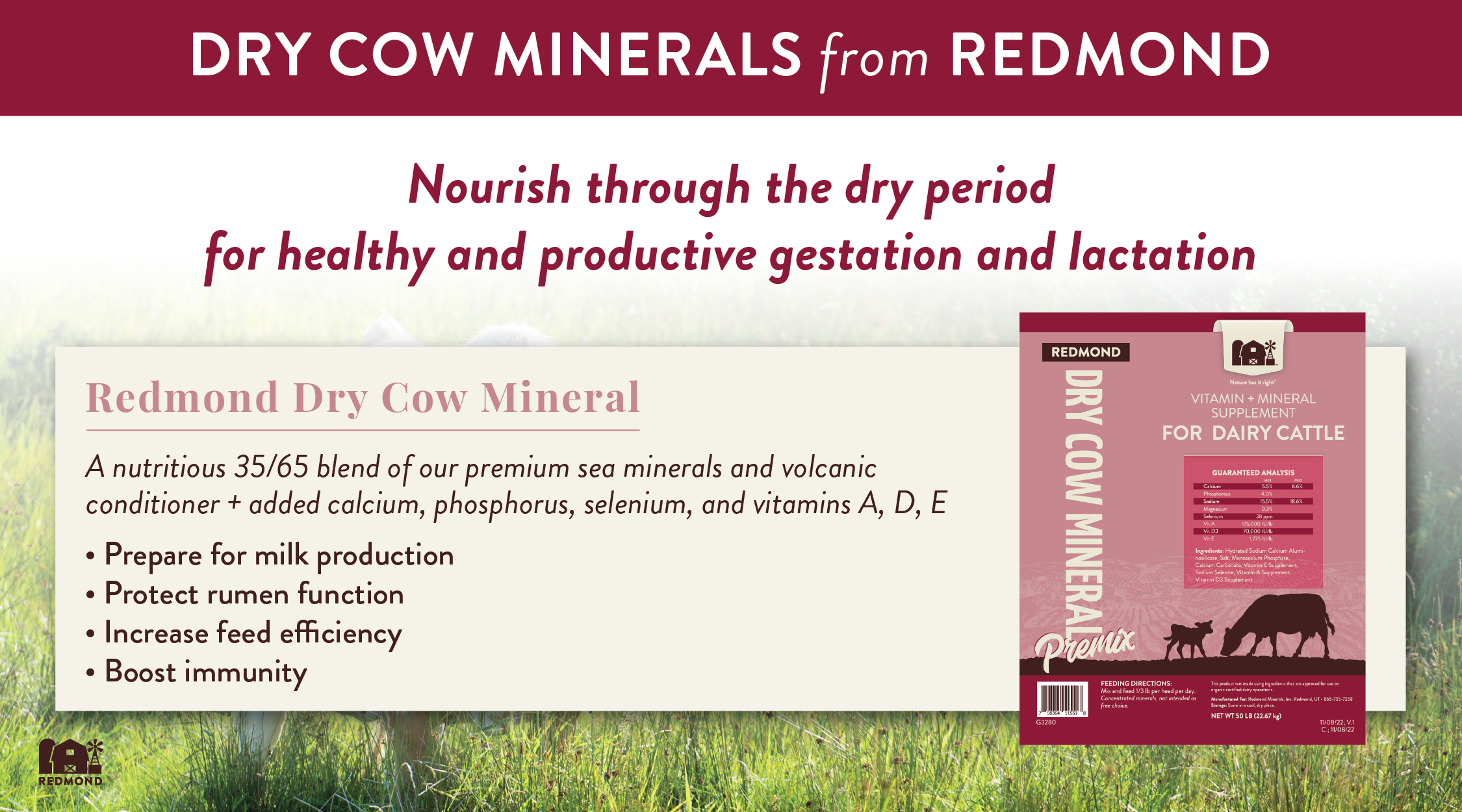
For dry cows, we recommend offering our delicious Dry Cow Minerals. This pre-mix contains a 35/65 blend of our premium sea minerals and volcanic conditioner and is fortified with extra calcium, phosphorus, selenium, and vitamins A, D, and E. Redmond Dry Cow Mineral gives your herd what they need to prepare for milk production during the dry periods’ naturally reduced rumen efficiency. Dry Cow Mineral is part of our Redmond Dairy program that helps your animals thrive through every life stage.
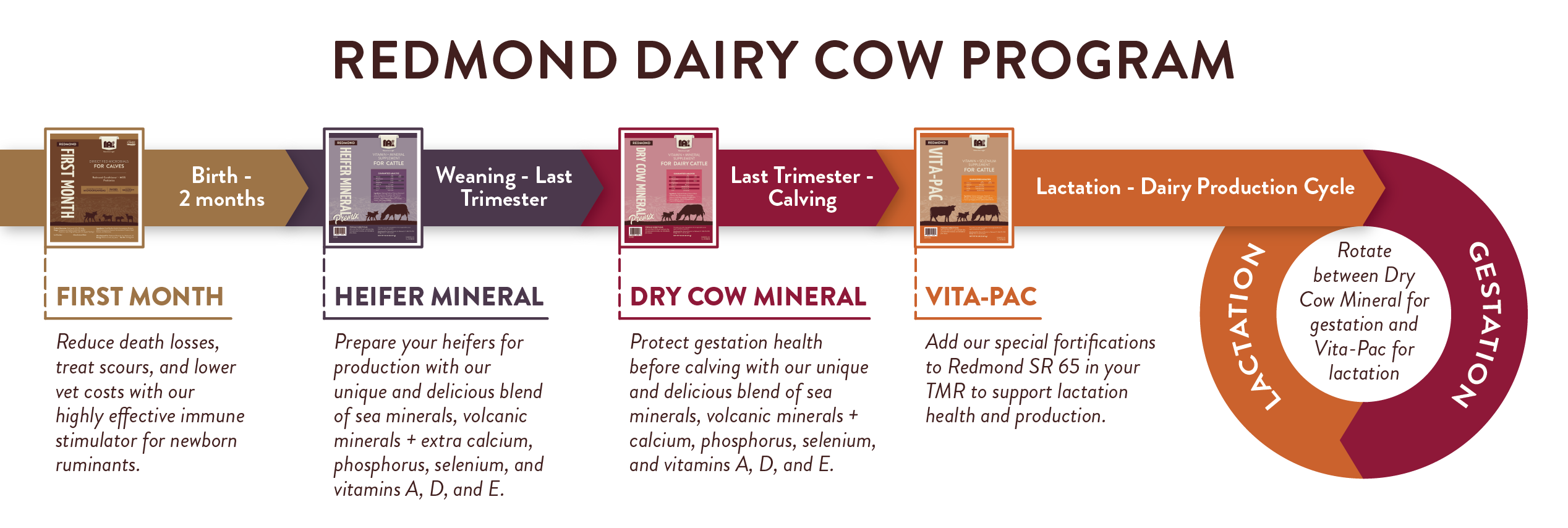
Our animal health experts are always looking for new ways to help your animals thrive. Redmond minerals can help nourish Give Redmond Minerals a call at  try today and get back to what you love about raising animals!
try today and get back to what you love about raising animals!
© 2024 Redmond Minerals Inc.

